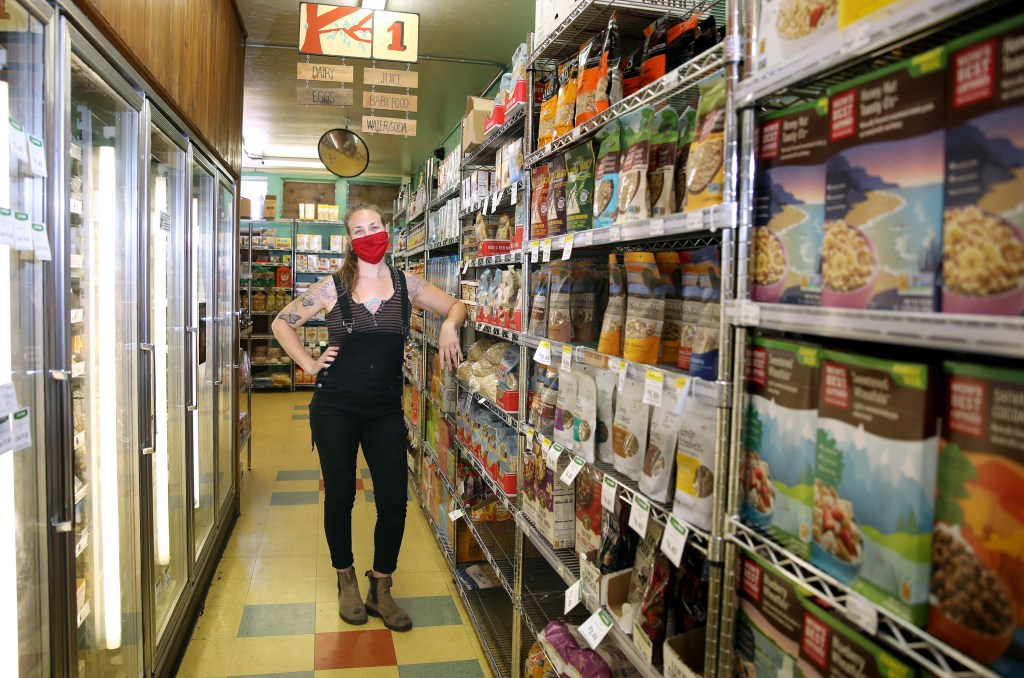At approximately 3,000 square feet, the Isla Vista Food Co-op is small and unassuming. It is tucked away on a shady street in the bustling college town and has no more than five aisles. Nevertheless, the store has been an essential component of the community since it was jointly founded by I.V. residents and university students in January 1972, especially during the uncertainties of the COVID-19 outbreak.
After the announcement that an I.V. resident tested positive for coronavirus in late March, general manager Melissa Cohen and her team sprang into action. “Are we prioritizing the health and safety of our workers?” Cohen asked. She worked around the clock to answer this question in the affirmative, leading her team in concrete steps like installing a sanitizing station at the front door.
“We require everybody to sanitize their hands,” Cohen said. “That way, if a customer touches a product and then a worker touches the same product, we are reasonably assured that a customer’s hands were sanitized.” They also dismantled the patio gathering space, taped off the bulk-food section, and only allow 10 customers in the store at a time, as mandated by the Santa Barbara Public Health Department.
Fourth-year environmental studies major and co-op regular Jacob Bider found their efforts worthwhile. “Because the co-op has taken this outbreak seriously and made changes to their daily operations in an effort to adapt to it, I am very comfortable shopping there,” he said.
The co-op is unique in that it is the only grocery store in Santa Barbara owned and controlled by its customers. Without the national oversight that larger markets have, the co-op is able to make decisions quickly and based exclusively on the wants and needs of its customers.
“With any major grocery store — whether it’s Whole Foods, Walmart, or Trader Joes — the goal is efficiency and productivity,” Cohen explained. “We run the store differently in that we have a more collective decision-making process. And our foremost goal is to always uphold the views of the community,” she added.
Beyond following government protocol, the co-op has turned to a national network of cooperatives known as the National Cooperative Grocers. As a long-standing member of the network, Cohen is able to connect with other store owners and share disaster-related documents, protocols, and employee roles.
“When a crisis is going on, it’s super awesome to have a group of humans that are here to support the health of the cooperative,” Cohen said of the network.
An important topic within the co-op grocers’ network has been the ongoing economic viability of owning a food co-op during times of crisis. Cohen estimates that the co-op sees half the number of customers per day as before the outbreak, just two months ago. Bider, for example, has reduced the number of times he goes to the co-op from five visits a week to just one.
But while Bider and other students have reduced their visits in accordance with social distancing protocol, members of the community have turned to the co-op for their grocery needs. In fact, the co-op has seen great diversity in their customer base since the outbreak began.
The co-op has also rolled out a curbside shopping program, which allows shoppers to receive their groceries from a distance. Additionally, the co-op was approved for a loan from the recently approved Payroll Protection Plan and operates as a grocery crisis partner for the California, Santa Barbara.
As Cohen and her team continue to grapple with the social and economic impacts of the outbreak, the co-op is keeping its doors open and encouraging shoppers to follow its social media and continue buying items as safely as possible.
“We are trying to find a balance. It is kind of like a dance,” Cohen said. “Ultimately, the co-op will come out of this better and stronger.”
Clarification: This story was updated on May 12 to clarify the role of I.V. residents in establishing the co-op, and the new protocols the co-op has implemented.
At the Santa Barbara Independent, our staff continues to cover every aspect of the COVID-19 pandemic. Support the important work we do by making a direct contribution.

